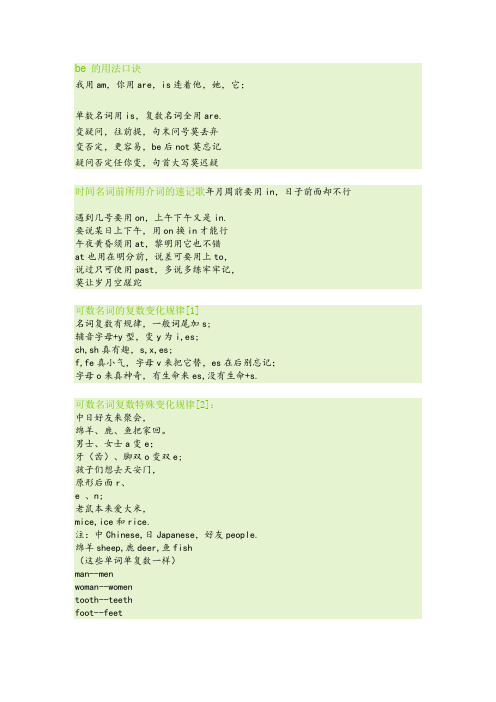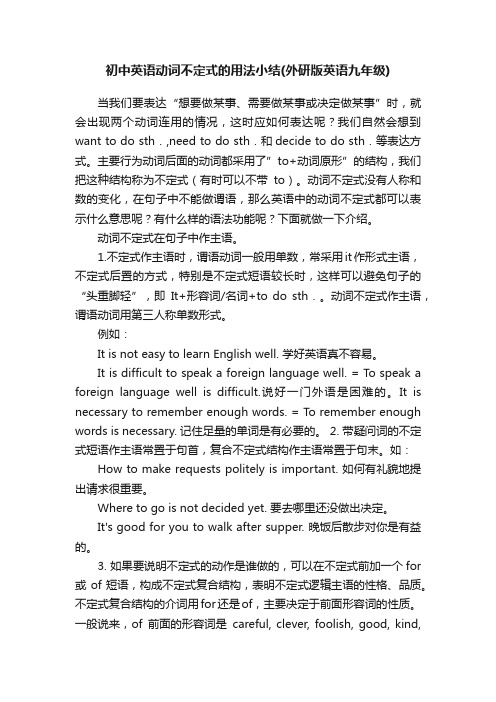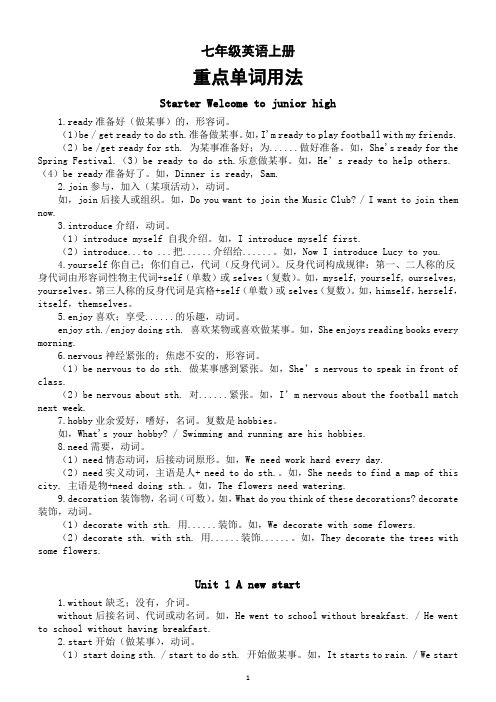初中英语-mean用法总结
译林版初中英语八年级上册期末复习Units5-8单元知识点梳理归纳

译林版初中英语八年级上册期末复习Units5-8单元知识点梳理归纳译林版初中英语八年级上册Unit5 Wild animals知识点梳理【词形变化】1.die vi.死→dead adj.死的→death n.死,死亡2.mean vt.意思是,意味着→meaning n.意思→meaningful adj.有意义的→meaningless adj.无意义的3.born adj.出生的→birth n.出生4.beginning n.开始,起初→begin vt.&vi.开始5.sadly adv.令人遗憾地;伤心地→sad adj.伤心的,难过的→sadness n.伤心,悲伤6.mainly adv.主要地,大部分→main adj.主要的7.danger n.危险→dangerous adj.危险的8.action n.行动;行为→act vt.& vi.行动,表演→active adj.积极的,活跃的→actively adv.积极地,活跃地9.closed adj.关闭的→close vt.&vi.关,关闭→close adj.紧密的,亲密的→closely adv.紧密地10.lost adj.迷路的,迷失的→lose vt.遗失,失去11.hunter n.猎人→hunt vt.& vi.打猎,猎杀12.living n.生存,生计→living adj.活的,现存的→live vi.居住,生活13.illness n.疾病→ill adj.生病的14.slowly adv.缓慢地→slow adj.缓慢的【重点短语】1.live in the wild 生活在野外2.have/take pity on wild animals 同情野生动物3.at four months old 在四个月大时4.weigh over 35 kilograms 重达35公斤多5.for the first time 第一次6.in the beginning 一开始7.learn to look after oneself 学会照顾自己8.live on a special kind of bamboo 以一种特殊的竹子为生9.as a result 因此10.in danger 处境危险11.take action right away 马上采取行动12.build more panda reserves 建造更多的熊猫自然保护区13.make laws to protect pandas 制定法律保护大熊猫14.at birth 出生时,诞生时15.work out easy Maths problems 算出简单的数学问题16.with the help of their mouth and ears 借助于它们的嘴巴和耳朵17.get lost 迷路18.be dangerous to humans 对人类有危险19.lose their lives 丧失他们的生命20.in the daytime 在白天【重点句型】1.So could you please not eat them?(P56)句意:所以请你不要吃掉它们好吗?Could you please…?意为“请你……好吗?”,其中Could不表示过去,只表示比can更有礼貌的请求,属非正式请求,语气较委婉;please 之后要接动词原形,其否定形式是在please之后加not,即Could you please not…?其肯定回答常用Sure./Certainly./of course,I'd love to.其否定回答常用Sorry.…如:一Could you please teach me how to swim? 请你教我如何游泳好吗?一Certainly.当然可以。
初中英语48个常见形容词总结归纳(超级详细版)

初中英语48个常见形容词总结归纳(超级详细版)本文将总结归纳初中英语中常见的48个形容词,供大家参考和研究。
以下是这些形容词的详细介绍:1. Tall - 高的描述一个人或物体的高度。
2. Short - 矮的描述一个人或物体的短小程度。
3. Happy - 快乐的形容一个人感到快乐或高兴的状态。
4. Sad - 伤心的形容一个人感到悲伤或难过的状态。
5. Smart - 聪明的形容一个人智力高或有才智。
6. Stupid - 笨的形容一个人智力低或愚笨。
7. Beautiful - 美丽的形容一个人或物体外貌美丽。
8. Ugly - 丑陋的形容一个人或物体外貌丑陋或不好看。
9. Strong - 强壮的形容一个人的体力或力量强大。
10. Weak - 虚弱的形容一个人的体力或力量虚弱。
11. Brave - 勇敢的形容一个人有勇气或无畏。
12. Cowardly - 胆小的形容一个人胆小或懦弱。
13. Friendly - 友好的形容一个人待人友好或易于交往。
14. Hostile - 敌对的形容一个人对他人怀有敌意或不友好。
15. Honest - 诚实的形容一个人做事讲实话或守信用。
16. Dishonest - 不诚实的形容一个人不讲实话或不守信用。
17. Generous - 慷慨的形容一个人乐于助人或大方。
18. Stingy - 吝啬的形容一个人不愿意给予或小气。
19. Agressive - 进攻性的形容一个人具有进攻性或攻击性。
20. Passive - 被动的形容一个人缺乏主动性或消极。
21. Energetic - 精力充沛的形容一个人精力旺盛或充满活力。
22. Tired - 疲劳的形容一个人感觉疲倦或无精神状态。
23. Clever - 聪明的形容一个人机智或灵活。
24. Clumsy - 笨拙的形容一个人动作不灵活或不熟练。
25. Interesting - 有趣的形容一个人或事物有趣或引人入胜。
初中英语词语用法口诀

be 的用法口诀我用am,你用are,is连着他,她,它;单数名词用is,复数名词全用are.变疑问,往前提,句末问号莫丢弃变否定,更容易,be后not莫忘记疑问否定任你变,句首大写莫迟疑时间名词前所用介词的速记歌年月周前要用in,日子前面却不行遇到几号要用on,上午下午又是in.要说某日上下午,用on换in才能行午夜黄昏须用at,黎明用它也不错at也用在明分前,说差可要用上to,说过只可使用past,多说多练牢牢记,莫让岁月空蹉跎可数名词的复数变化规律[1]名词复数有规律,一般词尾加s;辅音字母+y型,变y为i,es;ch,sh真有趣,s,x,es;f,fe真小气,字母v来把它替,es在后别忘记;字母o来真神奇,有生命来es,没有生命+s.可数名词复数特殊变化规律[2]:中日好友来聚会,绵羊、鹿、鱼把家回。
男士、女士a变e;牙(齿)、脚双o变双e;孩子们想去天安门,原形后面r、e 、n;老鼠本来爱大米,mice,ice和rice.注:中Chinese,日Japanese,好友people.绵羊sheep,鹿deer,鱼fish(这些单词单复数一样)man--menwoman--womentooth--teethfoot--feetchild--childrenmouse--mice一般现在时态(一)I、we、you、they作主语,动词原形后面跟;否定句,更容易,动词前面加don't;疑问句,别着急,句首Do,来帮你,后面问号别忘记;肯定回答用Yes,I、we、you、they加上do;否定回答要用No,I、we、you、they加don't.一般现在时态(二)主语三单他、她、它,动三形式后面压,词尾一般s加;辅音字母+y型,变y为i,es;ch,sh真有趣,s,x,es;三个特殊那里去?has、goes和does;否定句,记住它,动词前面doesn't;疑问句,别着急,句首Does,来帮你;肯定回答用Yes,he、she、it加does;否定回答要用No,he、she、it、doesn't;Does、doesn't来帮你,后面动词定注意,恢复原形要切记。
冀教版初中英语中考 考点知识过关 第十六讲 九年级 Unit 7—Unit 8

填)
C. separate
D. serious
into three groups to play games.(盲
separates
3.A large river runs through the city and from the south.
4.Wherever I go, nothing can separate me
பைடு நூலகம்
考点5 mean的用法
好题在线
18.All around the world, people drink tea. But tea does not mean the same thing to everyone. (盲填)
19.mean, anyone, didn't, to, hurt, I I didn't mean to hurt anyone .
第一部分 考点知识过关
第十六讲 九年级Unit 7—Unit 8
目录
考点
•考点1 separate的用法 •考点2 share的用法 •考点3 last的用法 •考点4 experience的用法 •考点5 mean的用法 •考点6 praise的用法
考点
考点1 separate的用法
教材语境 Danny almost hits Steven, but Brian and Jenny jump in to separate them.
好题在线
5.Some foreigners living in our city will be invited to share their life experiences with us. (盲填)
6.My sister likes making friends. She often shares her ideas with __t_h_e_m___(they).
初中英语动词不定式的用法小结(外研版英语九年级)

初中英语动词不定式的用法小结(外研版英语九年级)当我们要表达“想要做某事、需要做某事或决定做某事”时,就会出现两个动词连用的情况,这时应如何表达呢?我们自然会想到want to do sth.,need to do sth.和decide to do sth.等表达方式。
主要行为动词后面的动词都采用了”to+动词原形”的结构,我们把这种结构称为不定式(有时可以不带to)。
动词不定式没有人称和数的变化,在句子中不能做谓语,那么英语中的动词不定式都可以表示什么意思呢?有什么样的语法功能呢?下面就做一下介绍。
动词不定式在句子中作主语。
1.不定式作主语时,谓语动词一般用单数,常采用it作形式主语,不定式后置的方式,特别是不定式短语较长时,这样可以避免句子的“头重脚轻”,即It+形容词/名词+to do sth.。
动词不定式作主语,谓语动词用第三人称单数形式。
例如:It is not easy to learn English well. 学好英语真不容易。
It is difficult to speak a foreign language well. = To speak a foreign language well is difficult.说好一门外语是困难的。
It is necessary to remember enough words. = To remember enough words is necessary. 记住足量的单词是有必要的。
2. 带疑问词的不定式短语作主语常置于句首,复合不定式结构作主语常置于句末。
如:How to make requests politely is important. 如何有礼貌地提出请求很重要。
Where to go is not decided yet. 要去哪里还没做出决定。
It's good for you to walk after supper. 晚饭后散步对你是有益的。
人教版(新目标)初中英语九年级上册Unit3知识点总结汇总

Unit3 单词请点击绿标播放restroom [ˈrestru:m] n.(美)洗手间;公共厕所stamp [stæmp] n. 邮票;印章bookstore [ˈbukstɔ:(r)] n. 书店beside[bɪˈsaɪd] prep. 在……旁边;在……附近postcard [ˈpəustka:(r)d] n. 明信片pardon [ˈpa:(r)dn] v. 原谅 interj.请再说一遍washroom [ˈwɔʃru:m] n. 洗手间;厕所bathroom [ˈbɑ:θru:m]n. 浴室;洗手间normally ['nɔ:rməli] adv.通常;正常情况下rush [rʌʃ] v. & n. 仓促;急促suggest [səˈdʒest] v. 建议;提议pass by 路过;经过staff [sta:f] n. 管理人员;职工grape [greip] n. 葡萄central [ˈsentrəl] adj. 中心的;中央的Nearby [ˌnɪrˈbaɪ] adj.附近的;邻近的adv.在附近;附近Pardon me 抱歉, 对不起;什么,请再说一遍mail [meil] v. 邮寄;发电子邮件n. 邮件east [i:st] adj. 东方的;东部的adv.向东;n.东方fascinating [ˈfæsineitiŋ] adj.迷人的;有吸引力的. Inexpensive[ˌɪnɪkˈspensɪv] adj.不昂贵的Uncrowded [ʌnˈkraʊdɪd] adj.不拥挤的;人少的convenient [kənˈvi:niənt] adj. 便利的;方便的mall [mɔ:l] n. 商场;购物中心clerk [kla:k][kl:rk] n. 职员corner [ˈkɔ:(r)nə(r)] n. 拐角;角落politely [pəˈlaitli] adv. 礼貌地;客气地request [riˈkwest]n. 要求;请求direction [diˈrekʃn] [daiˈrekʃn] n. 方向;方位correct [kəˈrekt] adj. 正确的;恰当的polite [pəˈlait] adj. 有礼貌的;客气的. direct [diˈrekt, daiˈrekt]adj. 直接的;直率的. speaker [ˈspi:kə] n.讲(某种语言)的人;发言者whom [hu:m] pron. 谁;什么人impolite [ˌɪmpəˈlaɪt] adj. 不礼貌的;粗鲁的address [əˈdres], [ˈædres] n.住址;地址;通讯处. Underground [ˈʌndəɡraʊnd] adj.地下的;n.地铁Parking lot n.停车场course [kɔ:(r)s] n. 课程;学科Italian [Iˈtæli ən] adj.意大利人的;n.意大利人语Tim [tim] 蒂姆(男名)02Unit3 知识梳理Unit3 Could you please tell me where ....【重点短语】1.a pair of 一对,一双,一副2.between A and B 在a和b之间3.on one’s / the way to 在去……的路上4.pardon me 什么,请再说一遍5.pass by 路过经过6.look forward to 盼望期待7.excuse me 打扰了请原谅8.get some information about 获取有关……的一些信息9.turn leftight 向左向右转10.go past 经过路过11.a little earlier 早一点儿12.a good place to eat 一个吃饭的好地方13.in different situation 在不同的情况下14.on time 准时按时15.get to 到达16.have dinner 吃晚餐17.on one’s / he right在右边e on 快点请过来19.the shopping center 购物中心20.the corner of....... 的角落/拐角处21.lead into 导入,引入【重点句型】1.问路常用的句子:①Do you know where is … ?②Can you tell me how can I get to …?③Could you tell me how to get to …?④Could/Will/Would you please tell me sth.表示十分客气地询问事情Could you tell me how to get to the park?请你告诉我怎么才能去邮局好吗?2. decide to do 决定做…...She decided to go to have lunch. 她决定去吃午餐。
初中英语新外研版七年级上册Starter—Unit 1重点单词用法总结(2024秋)

七年级英语上册重点单词用法Starter Welcome to junior high1.ready准备好(做某事)的,形容词。
(1)be / get ready to do sth.准备做某事。
如,I'm ready to play football with my friends.(2)be /get ready for sth. 为某事准备好;为......做好准备。
如,She's ready for the Spring Festival.(3)be ready to do sth.乐意做某事。
如,He’s ready to help others.(4)be ready准备好了。
如,Dinner is ready, Sam.2.join参与,加入(某项活动),动词。
如,join后接人或组织。
如,Do you want to join the Music Club? / I want to join them now.3.introduce介绍,动词。
(1)introduce myself 自我介绍。
如,I introduce myself first.(2)introduce...to ...把......介绍给......。
如,Now I introduce Lucy to you.4.yourself你自己;你们自己,代词(反身代词)。
反身代词构成规律:第一、二人称的反身代词由形容词性物主代词+self(单数)或selves(复数)。
如,myself, yourself, ourselves, yourselves。
第三人称的反身代词是宾格+self(单数)或selves(复数)。
如,himself,herself,itself,themselves。
5.enjoy喜欢;享受......的乐趣,动词。
enjoy sth./enjoy doing sth. 喜欢某物或喜欢做某事。
初中英语常用的动词用法

初中英语常用的动词用法初中英语常用动词用法:1. allow sb. to do sth. 允许某人去做某事My father allowed me to go out for a walk after finishing my homework.2. asked sb. (not) to do sth. 叫某人做事某事(叫某人不要去做某事)My father asked me to study hard.He asked me not to swim alone.be asked to do sth. 被叫去做某事/被邀请去做某事I was asked to have a dinner with them yesterday.3. be afraid to do sth. 害怕做某事She is afraid to ask me questions.4. be afraid of doing sth. 害怕做某事I am afraid of going out at night.5. be afraid of sth. 害怕某物He is afraid of snakes.6. be amazed to do sth. 对做某事感到惊讶He was amazed to meet the girl there.be amazed at sth. 对某事感到惊讶they were amazed at the news7. be busy doing/with sth. 忙于做某事 (常考)e.g: I was busy washing my car at that time. 那时候我正忙于清洗我的车子。
I am busy with my work.8. be ing/going/leaving/flying/moving/dying(某些位移动词用进行时态时表将来)the bus is ing/the dog is dying.9. be excited to do sth. 对做……感到兴奋Jacky was excited to travel there by plane.be excited at sth.Lily was excited at his words.be excited about doing sth.he was excited about passing the exam without going overing books.10. be frightened to do sth. 害怕去做某事Sam is frightened to ride a horse.11. be glad/happy to do sth. 高兴去做某事she is happy to clean the blackboard with me.be pleased to do sth. 高兴做某事she was pleased to help the old man yesterdaybe pleased with sth. 对某事感到高兴/满意the teacher was pleased with my answer.12. be interested in sth./doing sth. 对某事感兴趣/对做某事感兴趣she is interested in swimming in the river.My brother is interested in Chinese.13. be/get ready for/to do sth.Be ready for sth. 为某事做好了准备We are ready for the exam.Be ready to do sth. 为做某事做好了准备We are ready to have a birthday party for her.get ready for sth.为某事在做准备We are getting ready for the exam.13. be sorry to do sth. 对做某事感到抱歉14. be surprised to do sth. 对做某事感到惊奇be surprised at sth. 对某事感到惊奇15. be worth doing sth. 值得做某事 (worth 后接动词-ing 形式,常考)16. begin to do sth.begin/start to do/doing sth.17. can/be able to afford (to buy) sth. 有能力购买(供)……18. can/may/must do sth. could/would/should/might do sth.19. can't wait to do sth. 迫不急待地去做某事20. decide to do sth. 决定去做某事make up one's mind to do sth. 下决心去做某事 (常考)make a decision to do sth. 对做某事作出决定21. deserve to do sth. 值得/应该做……22. encourage sb. to do sth.鼓励某人去做某事23. enjoy doing sth. 乐意去做某事24. expect (sb.) to do sth. 期望去做某事25. fail to do sth. 做某事失败succeed doing sth. 成功做了某事26. finish doing sth. 做完某事(后接动词-ing形式) (常考)27. follow sb to do sth. 跟随某人去做某事28. get sb. to do sth.make sb. do sth.let sb. do sth.29. get/have a chance to do sth.得到一个做某事的机会30. give/pass/show/lend/sell sb. sth./ sth. tosb.buy/get/bring sb. sth. / sth. for sb.31. go on to do sth. 继续做事(常考)go on doing sth. 继续做事(常考)32. hate to do/doing sth. 讨厌/不喜欢做某事33. have fun doing sth.34. have problems doing sth.做某事遇到困难35. have sb. do sth.have sth. donehave sth. to do 有事要做36. hear sb. do sth. 听到某人做某事(后接动词原形,常考)hear sb. doing sth. 听到某人正在做某事(常见)37. help to do sth. 帮忙做某事help sb. (to) do sth.帮助某人做某事38. hope/wish to do sth. 希望做某事wish sb. to do sth. 希望某人做某事39. I t seems that 这像是……(后接从句)seem to dosth.seem +adj.40. It's + adj.+(for sb.) to do sth.It's + adj. +(of sb.) to do sthe.g: It's glad for him to hear the news.41. It takes sb. some time/money to do sth. 花费某人多长时间做某事(常考)42. pay …for…costspend…on…..it take …to do sth.43. It's best for sb to do sth.. 对某人来说做某事是最好的had better do sth. 最好做某事 (注意had没有时态和人称的变化,better后接动词原形)44. It's time for sb. to do sth. 是某人做某事的时候了45. keep (on)doing sth. 坚持做某事(常考)keep sb. doing sth. 让某人做某事(常考)keep sb. from doing sth. 阻止某人做某事(常考)keep sb./ sth. +adj.keep the book for 2 days 借这本书两天(不要用borrow或lend)46. learn to do sth. 学做某事learn sth. from sb. 向某人学习47. like to do/doing sth. 喜欢做某事like sb. to do sth. 喜欢某人做某事48. need to do sth.need doing sth./to be doneneedsth .needn't do sth.49. prefer to do sth. rather than do sth. 宁愿……而不愿……(常考)prefer doing sth. to doing sth. 喜欢做……胜过做……e.g: I prefer reading books to going shopping. 比起购物来,我更爱读书。
- 1、下载文档前请自行甄别文档内容的完整性,平台不提供额外的编辑、内容补充、找答案等附加服务。
- 2、"仅部分预览"的文档,不可在线预览部分如存在完整性等问题,可反馈申请退款(可完整预览的文档不适用该条件!)。
- 3、如文档侵犯您的权益,请联系客服反馈,我们会尽快为您处理(人工客服工作时间:9:00-18:30)。
mean用法总结,mean的用法及短语有哪些
mean用法总结
1. mean doing sth.
mean doing sth. 的意思是“意味着(必须要做某事或导致某种结果)”,其主语通常是指事物的词。
例如:
Being a student means studying hard. 作为一个学生,(意味着)你要努力学习。
Success means working hard. 成功意味着工作努力。
【误】Success means to work hard.
2. mean to do sth.
mean to do sth. 的意思是“打算或企图做某事”, 其主语通常是表示人的名词或代词,其过去完成式表示“本来打算做某事”。
例如:
What do you mean to do with it? 你打算把它怎样处理?
We mean to call on you tomorrow. 我们打算明天看望你。
He had meant to leave on Sunday, but has stayed on. 他本来想星期天走的,但又留了下来。
【误】We mean calling on you tomorrow.
don't mean to do sth. 是其否定式,通常表示“无意做某事”。
例如:
John really upset Granny,but I'm sure he did not mean to. 约翰真让奶奶心烦,不过我相信他是无意的。
3. mean sb. to do sth.
mean sb. to do sth.的意思是“打算让某人做某事”。
例如:
I mean you to work as our spokesman. 我想请你当我们的代言人。
Do you really mean him to believe that your plan was right? 你真打算让他相信你的计划是对的吗?
4. mean后接名词、副词或从句
mean后接名词或副词,意为“表示;打算;存心”等意思;后接 that 从句,意为“表示……”。
例如:
“I meant well,”he said. 他说,“我是好意。
”
The sign means that the road is blocked. 这个标志表示此路不通。
5. mean用来解释某个词语的含义
mean 可用来解释某个词语的含义,表示“意思是……”,其后面的单词形式常与被解释的单词形式保持一致。
如解释一个动词时,后接动词不定式;解释一个动名词,后接动名词形式。
例如:
“Quake” means “to shake”. “Quake”的意思是“震动”。
Having good table manners means knowing, for example, how to use knives and forks, when to drink a toast and how to behave at the table.(Unit 6)餐桌上,懂礼貌意味着了解诸如如何使用刀叉,该何时祝酒,如何体面用餐等。
6. What do / did you mean by...?
该句型的意思是“你……是什么意思?”例如:
What do you mean by acting like this? 你这样做是什么意思?
7. be meant for
该短语的意思是“打算给予;打算作……用”。
例如:
What is this meant for? 这准备作什么用?
These rooms are meant for the children's centre. 这些房间是打算用作少年活动中心的。
8. I mean
I mean 的意思是“就是说;我是说”的意思,常用来更正或补充前面所说的话。
例如:
She is smart—I mean, she knows exactly what I think. 她很聪明——我的意思是说,她完全知道我的想法。
Well, eh yes, I mean no. I mean, I found the bathroom, but I didn't find what I was looking for! 嗯,呃,是呀,我的意思是没有。
我是说我找到了浴室,但我没找到我在找的东西!
动词mean的用法及短语有哪些
1. 表示“打算”,主语只能是人,其后可接不定式,但不接动名词。
如:
I mean to get to the top by sunrise. 我打算在日出时到达山顶。
Do forgive me—I didn’t mean to interrupt. 真对不起——我不是有意打扰你。
若表示过去未曾实现的打算,即表示本来打算做但并未做成的事,通常用过去完成时,有时在不引起误解的情况下也可用一般过去时。
如:
We had meant to be early, but we got up too late. 我们本来想早点来的,但起床起迟了。
I (had) meant to come, but something happened. 我本想来,但有事就没有来。
以上意思有时也用“meant to have+过去分词”来表示。
如:
I meant to have told you about it yesterday.=I had meant to tell you about it yesterday. 我本来打算昨天把这事告诉你的。
2. 表示“意味着”“需要”等,句子主语一般是事物(有时也可用 it, this, that 等),其后可接动名词,但不接不定式。
如:
This illness will mean going to hospital. 得了这种病就意味着要住院。
He is determined to get a seat even if it means standing in a queue all night. 即使要整夜排队,他也决心要买到票。
比较并体会以下句子:
If we mean to catch the early bus, that means getting up before five. 要想赶早班车,我们就得在5点钟以前起床。
这样用时也可接后that从句作宾语。
如:
This discovery means that we will spend less on food. 这一发现意味着我们将减少在食品上的花费。
注:当要解释词义时,其后可接不定式。
如:
“Gaze” means to keep one’s eyes turned in a particular direction for a long time. gaze的意思是使视线长时间对着某方向。
3. 表示“有意义”“有价值”,通常与 much, little, a lot, a great deal, nothing, everything, anything 等词连用。
如:
Money means nothing to me. 钱对我来说是无所谓的。
You don’t know how much you mean to me. 你不知道我多么喜欢你。
